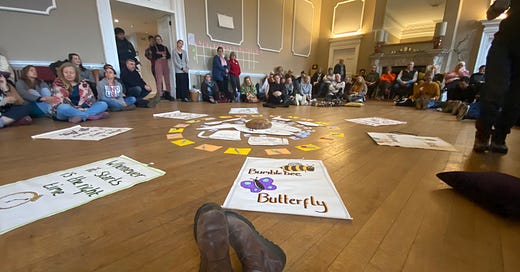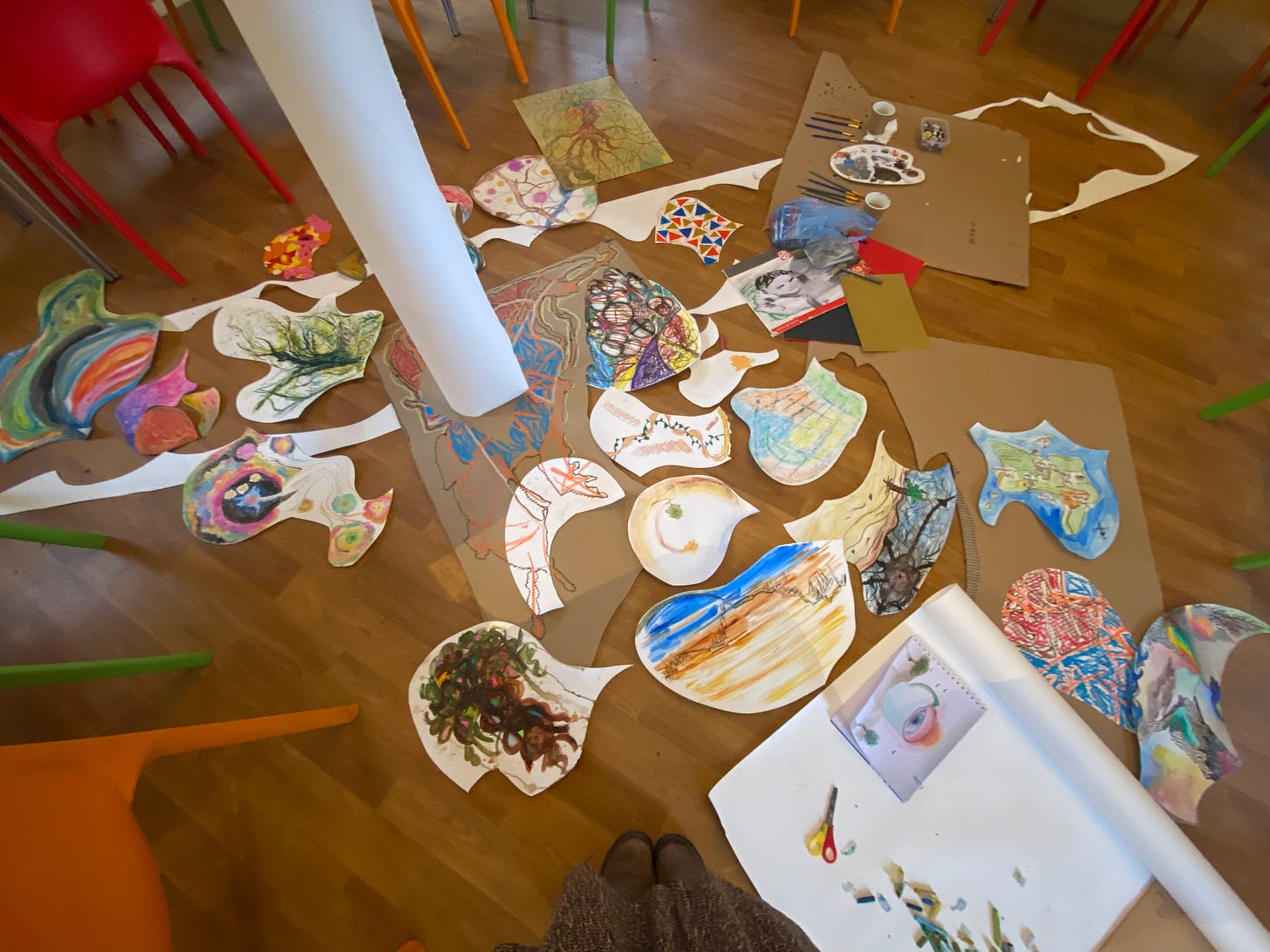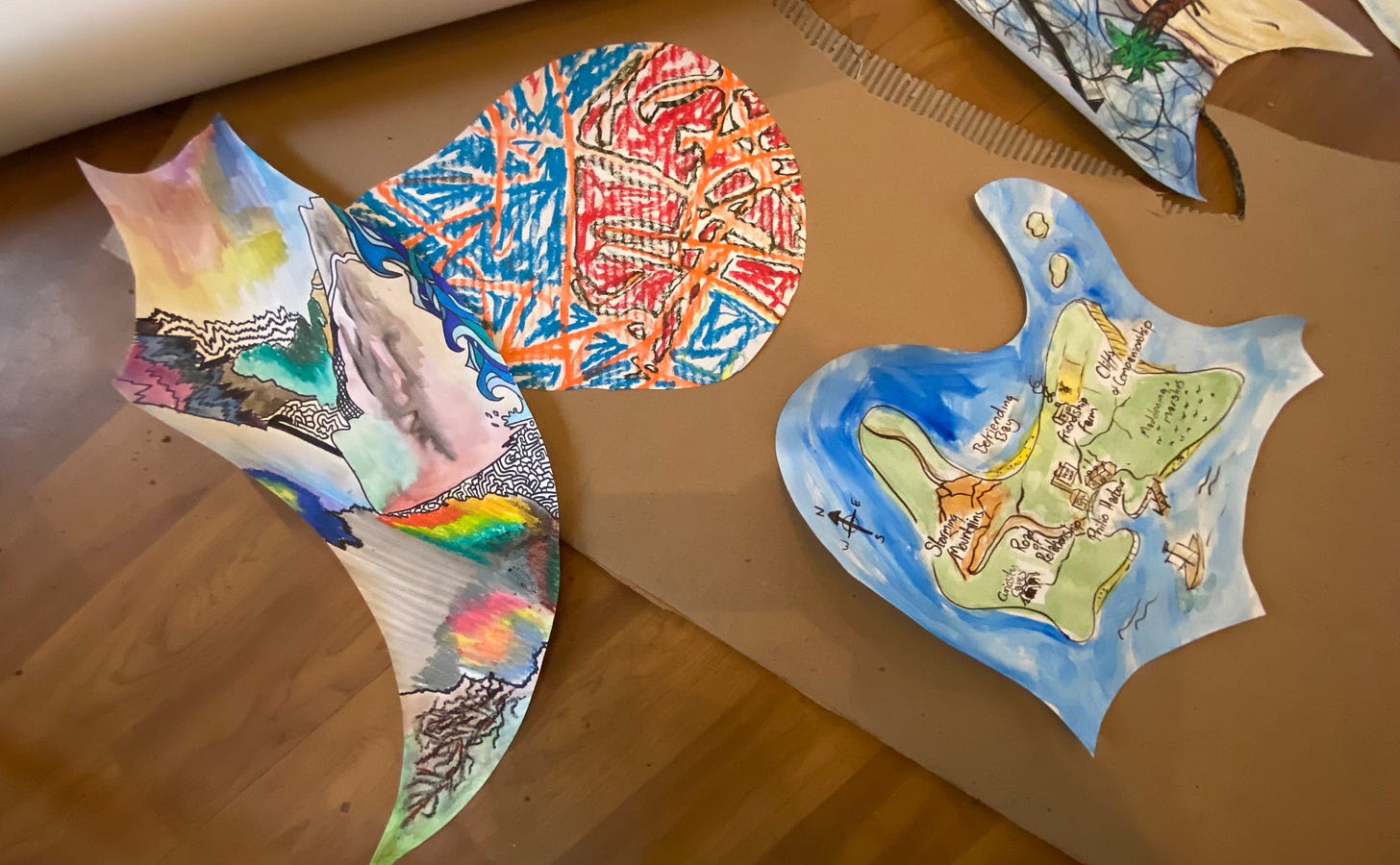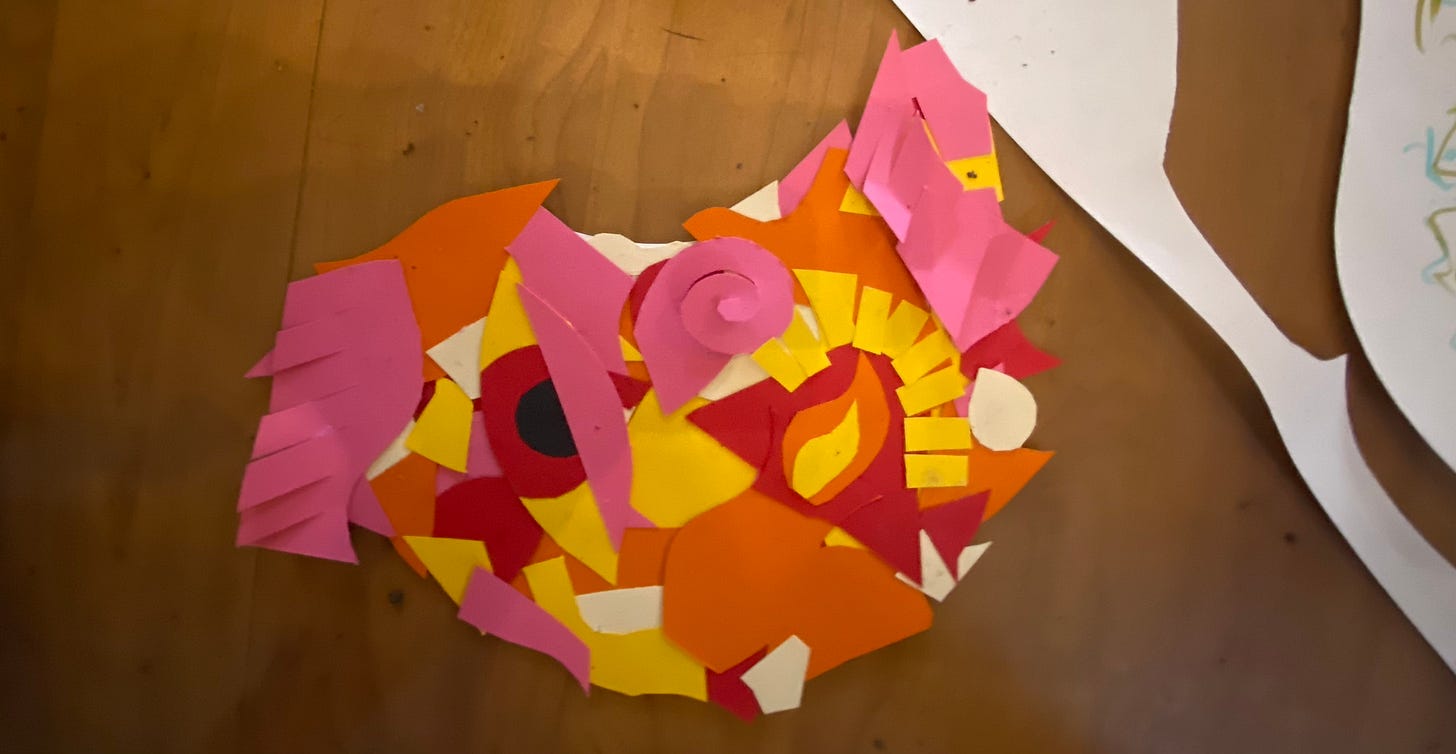‘It is profane, as well as grandiose, to manipulate the Bible in order to apologise for America’
William Stringfellow (1973)
‘...and after the fire, a gentle whisper’
1 Kings 19:12
There are six books that I carry around with me wherever I go.
They are like fierce old friends, holding me true, making me brave, resisting the part of me that always needs to feel that I am ‘right’.
It would be fair to say that all of them, particularly the first, read me, as much as I read them. I am undressed by them, again and again and again.
And that first is my Bible. A tattered creature that I was given when I left my first intentional Jesus community in 2005.
It has travelled the world with me and been left outside in many a storm. It’s full of yellow highlights and scribbles, and on the back page are the names of 9 young (at the time) South African men that I met in the ‘youth’ wing of Cape Town’s notoriously overcrowded maximum security prison, Pollsmoor, when I visited later that same year.
I told them I would pray for them...for Calvin who liked candy...Frankie who liked cricket...Phulminzi who liked church. I’m not sure how much praying I’ve done, but their names are still there. Not letting me forget G_d’s mysterious tenderness towards the incarcerated. And below their names, written in a different pen, is this quote, which I think must be from Rilke: ‘hold with patience all that is unresolved in your heart’.
The second is my darkly thumbed (by which I mean filthy with love and attention) copy of Catherine Keller’s Face of the Deep: a theology of becoming. A book I have spent so much time with that it now inhabits my body. Every time I open it I remember my own voice, and that I am meant to be using it.
The others are all thin, punchy little books, written by beautiful, poetic, justice-loving, fire-stoking men.
The Poet, The Warrior, The Prophet, by Brazilian theo-poet and psychoanalyst Rubem Alves. I & Thou by beloved Jewish theologian-sociologist Martin Buber. The Prophetic Imagination, by lover of artists and all that is lyrical, Hebrew Bible-scholar Walter Brueggemann. And An Ethic for Christians & Other Aliens in a Strange Land by lawyer, activist and theologian William Stringfellow.1
‘I expect such indulgences to multiply, to reach larger absurdities, to become more scandalous, to increase blasphemously as America’s crisis as a nation distends.’
Stringfellow (1973)
Part I: Jesus & the President
And it is to this latter, truly prophetic (in my opinion) book - the reading of which is equivalent to drinking paint-stripper, removing layers of gloss to reveal what’s really beneath - that I have turned for strange comfort in the aftermath of the absurdly scandalous, blasphemous indulgence that was the inauguration of President Trump on Monday.
An indulgence that may, in many ways, not have been significantly more absurd than any other presidential or prime-ministerial inauguration that uses biblical imagery to justify itself.
I always come back to Wendell Berry’s ‘Bad News of the Gospels’ when I think of the claim of any government or nation state to be ‘Christian’:
‘Much is made in churches of the "good News" of the Gospels. Less is said of the Gospels’ bad news, which is that Jesus would have been horrified by just about every "Christian" government the world has ever seen. He would be horrified by our government and its works, and it would be horrified by him.
Surely no sane and thoughtful person can imagine any government of our time sitting comfortably at the feet of Jesus while he is saying, ‘Love your enemies, bless them that curse you, do good to them that hate you, and pray for them that despitefully use you and persecute you.”
Wendell Berry, Christianity & the Survival of Creation
Which of course applies to Biden and Bush as much as to Trump. And Blair and Starmer and all the rest.
The Bible has its own beating heart. Its own integrity. And its own deep, un-containable song, which stands in judgement of anyone and anything - particularly imaginal structures and the resultant social, religious and political systems - that resist the flourishing of all things.
But, as many are writing about in more detail than me, there was a distinct horror to this particular inauguration.
A significant part of the church, and its seemingly drunk theologians and ‘prophets’, has done an almost water-tight job of convincing many of us that this inauguration was more Messianic than Presidential.
It was impressive.
The young preacher waving his arms about as he blessed the land and called forth prosperity from its farthest reaches. Trump presenting himself as a ‘peace-maker’ in the line of Martin Luther King. This administration’s apparent prophetic resistance to any principalities and powers that block growth, success, joy and the entrepreneurial, pioneering spirit.
I remember reading Baudrillard at Uni, and this, as I understand it, was like the perfect Simulacrum.
The prophets and theologians of the MAGA movement are now managing a self-created ‘biblical reality’ that is so well-versed and self-re-inforcing, with it’s own internal logic of US exceptionalism, that it bears little resemblance to the original. And yet it has the power to seduce half the world, in the name of the tenderhearted Jesus that it at the same time effaces.
‘The simulacrum is never that which conceals the truth - it is the truth which conceals that there is none.
The simulacrum is true.’
Jean Baudrillard
MAGA, and its theological fore-runners (by which, btw, I certainly don’t mean everyone with conservative or traditional views...my own politics are all over the place) have created their own ‘biblical reality’.
But one read of Isaiah 58 (which I’ll be in conversation with friends about in a later post) is enough to expose how far that reality is from the Bible.
‘My concern is to understand America biblically...not the other way around, not...to construe the Bible Americanly. There has been much too much of the latter in this country’s public life and religious ethos. There still is.’
Stringfellow (1973)
The MAGA movement may be right that we humans long to ‘ride on the high hills of the earth’. That we need to be reminded that our light can ‘break forth like the morning’. That we are wired to have ‘glory’ be ‘our rear guard’.
We need vision and beauty-soaked imaginations and we yearn for real inspiration and hope. I have no doubt that many beautiful people will be breathing a genuine, energised, sigh of relief under Trump’s reign (I hear them do so already). One kind of tyranny being replaced by another, but this one is more amenable to them.
But the route to the kind of ‘glory’ that Isaiah describes is made plain.
We must tend to and raise up those that our societies reject. We must feed the hungry, open our homes to those who are cast out, clothe those who are nakedly suffering, stop exploiting our labourers and expose and unravel our structural wickedness.
That is not ‘woke-ness’ (by which I don’t mean such a ‘thing’ doesn’t exist).
It is Biblical Reality.
‘To interpret the Bible for the convenience of America... represents a radical violence to both the character and content of the biblical message.
It fosters a fatal vanity that America is a divinely favoured nation and makes of it the credo of a civic religion which is directly threatened by, and, hence, which is anxious and hostile toward the biblical word.’
Stringfellow (1973)
And, seduced as even I nearly was2 (because I too want cause for hope, and have many friends supportive of that movement that I choose to learn from), I experienced Monday’s inauguration as a court-prophet sanctioned sound blanket, that, through layer upon layer of distortion and parody, with significant drafts of truth in the mix, has layered itself over the prophetic voice of the Bible in order to silence it.
Like the perfect substitution of the ‘signs of the real’ for the ‘real’,3 in it we witnessed a kind of theology of death draped in the semblance of a cloak of life, using religious cues in a way that made it very easy for many around the world, including many of my friends, to delight in it.
Stringfellow writes beautifully about this distinction - between cultures of ‘life’ and cultures of ‘death’. His brave writing has been a genuine place of refuge for me this last week, and one that I felt to share.
I’ll continue to draw on his work, but I recommend reading ‘An Ethic for Christians & Other Aliens in a Strange Land’, and, if you want to learn more, my friends Bob Ekblad4 and
are deeply influenced by his work. Richard has written a fantastic series on his books.*************************
But now I want to talk about Rafael.
In resistance to Monday’s desecrating whirlwind of power and principality and pride, I want to share that there was a hotter ticket in town. It was hosted by a ten year old, and was more of a whisper than a whirlwind. But I’m pretty sure that Jesus would have preferred to be there.
Part II: Jesus & Rafael
Last weekend I co-curated a gathering (with an amazing team of people) for 200 people of all ages in a cold corner of Sussex.
The theme was the idea of resurrecting friendship as a means of resistance. Resistance to division... scarcity... othering... injustice... xenophobia... tribalism... pride... inhumane bureaucracy... destruction of the earth...
It’s hard to ignore the suffering of a friend, whether human or more than human. You don’t exploit or extract from a friend. You rarely want to hurt a friend. You try to understand the opinions of a friend, even when you disagree. You share your food with a friend. You wouldn’t let them go hungry.
Dostoevsky wrote that ‘Beauty will save the world’. But today I like theologian Jurgen Moltmann’s insistence that it is ‘friendship [that] will save the world’. And for 48 hours I really believed it.
The gathering was curated around whatever participants offered in response to the theme (which in turn was drawn from our beautiful friend
’s phd). So we had workshops around power & hospitality, the nature of soul-friendship, friendship & anarchy, mapping our friendships, practicing deep listening, tools for hosting conversations across difference, a photographic love song to a bruised but resilient piece of land, communing with trees, grief, lament, economies of friendship, song, improv, dance, cold-water swimming, poems, feasting.It was good.
טוב
On the Sunday morning we hosted a time, using Open Space technology, for people to offer new conversations and workshops in response to what was most alive for them from the weekend so far. What were they chewing on?
In the midst of conversations being offered around friendship & money, the wisdom of women’s bodies, the notion of weak centres, and the Enneagram, my friend Anna stood up and shared that her ten year old son, Rafael, wanted to host a conversation entitled ‘Have you made any new friends?’.
I was tired. I’d been holding much of the weight of the weekend, and was tempted to find a comfortable chair and curl up and snooze whilst people dived in to their various topics. But Rafael’s invitation caught my attention. Made my heart beat a little faster. That’s where I wanted to be. In a space hosted by that small wonder of a boy.
Rafael is the youngest child of friends from my first church.
He is probably just over 4’ (though I actually have no idea). Has sparkly eyes behind thick rimmed glasses. Curly hair. Loves wearing his furry hooded coat. And has a killer smile. Any gremlins lurking in your brain flee when he fires that smile at you. Which he does, often.
Over the weekend I often felt quite awkward. I had to take a lead and host from the front - be a mix of gregarious, vulnerable, available, alert, curious, authoritative and present, all at the same time. When in truth I was feeling pretty tired and shy.
And, somehow, this mystical little creature would quietly sidle up to me at just the moments I needed a friend. I had a moment of overwhelm amidst a big group in the entrance lobby. And there he was by my side. I walked in to the silent disco after a slightly bruising conversation (we were tired) feeling sad and a bit clueless. And there he was. At my side. Pointing to the red light on his headphones so I knew which channel he thought I should dance to.
I don’t know how he manages to move through space in such a way. I’ve seen animals do it before. Dogs lying next to the one in the room that most needs care. But rarely humans. Not in such a dynamic way at least...small enough to slip through space unnoticed and then there they are. My friend Bob used to say ‘Jesus is skinny...he can slip through even the tiniest crack’. Rafael seemed to have that quality to him too.
Anyway. Once I’d helped various people get to wherever it was they were going, I headed to the Fernery to join Rafael’s conversation. And, natural host that he was, he immediately turned his body towards the newcomer, waited for me to take a seat, put his hands politely between his knees, looked directly in to my tired eyes, and began to ask me whether I’d made any new friends over the weekend.
And here was the gift of our time. And why I know Jesus would prefer this invitation to that of the inauguration of a president.
Rafael has a stammer. Sometimes his words flow, and sometimes they don’t. And when they don’t, his body moves in ways that are at first surprising...like a fast flowing river being suddenly blocked by a protruding wall or rock...but in time began to feel like an extension of his voice, coaxing and inviting the words to work their way out in to the waiting sentences.
And, for the first time in the weekend, I realised that I couldn’t rush. My only way to be a friend to Rafael, and to the group, was to feel the ground beneath my feet, rest my body back in to my seat, and wait.
And that was when I properly noticed the others in the room.
I saw his Mum, Anna, sitting calmly with her hands crossed on her lap. And I saw my musician friend Julian, leaning back in to his chair with legs outstretched. And I noticed the ease with which he was present to the group, to himself, and to Rafael’s words.
It struck me that these two were just being themselves. That giving people space - not demanding anyone conform to their expectations - was a practice they already had deep in their bones.
Julian, like me, had struck up a friendship with Rafael over the weekend. And I could see why. Julian, like Rafael, felt safe. Like he had no need to judge. Before him was a space of open, positive regard. And his posture said he had all the time in the world. Take your time. There’s no rush.
I remember watching lovely Michael Sheen being asked a question by a young Welsh man, Leo, that, for different reasons to Rafael, struggled to voice his sentences. Leo’s nervous laughs and shyness were met by deep warmth, care and patience from Michael. I remember him saying ‘that’s alright...we’ve got plenty of time..take all the time you need Leo’. Whilst Leo squirmed and blushed, Michael kept gentle but clear eye contact and smiled warmly. He was utterly unfazed, and eventually a clear, concise question tumbled joyously from Leo’s lips.
I thought of this as I witnessed us listening to each other in the group. I could tell that Rafael was carefully taking in everything that was shared. At one point we were speaking about those times when a friend asks you to do something and you say ‘yes’, but you really want to say ‘no’. Rafael began to share his experience, and told us, in that same flow of words and breaks, with his arm keeping things moving, that in those moments he feels ‘regret’. I asked him where he feels that regret in his body and he instantly pressed his hand on his chest...’here’. I asked him if he knew why he felt regret and he said he wasn’t sure yet.
But five minutes later he had his answer, and our bodies waited, gently but with a sense of anticipation, for his shared wisdom. ‘I always... ... ... ... ... feel regret... ... ... ... ... because... ... ... ... ... ... ... ... ... ... ... I know it will make it harder’.
Which is exactly right, isn’t it. If we lie to our friend and to ourselves, even apparently in service of their needs, eventually it always makes it harder.
Conclusion: the whisper trumps the whirlwind
At the end of Trump’s inauguration I found myself thinking of that time with Rafael. The quality of attention in the room. The way it was deepened by our need for patience. The invitation that Rafael’s stammer offered us to rest for a while. To be present. Not in a rush. Attentive but not demanding. Not grasping. At ease. Still.
Stillness, in the Hebrew Bible, has a sense of letting go to it. A kind of disrobing of our normal identities and ideologies. Ceasing striving. Choosing rest. Being still. And such stillness allows us to hear what’s being said. What’s really being said.
I was reminded of the prophet Elijah who, having been found by G_d hiding in a cave, went to the mouth of that cave to listen for G_d’s voice.
‘Then a great and powerful wind tore the mountains apart and shattered the rocks before the Lord, but the Lord was not in the wind. After the wind there was an earthquake, but the Lord was not in the earthquake. 12 After the earthquake came a fire, but the Lord was not in the fire.
And after the fire came a gentle whisper. 13
When Elijah heard it, he pulled his cloak over his face and went out and stood at the mouth of the cave.’
1 Kings 19:11-13
Perhaps G_d’s voice occasionally is in the whirlwind. Perhaps some of the chaos and upheaval of the next months in the US and around the world will open some genuine hope and justice and possibility. But more often I think G_d’s voice is in the quiet. In the whisper. And the ones who can help me hear that whisper are not necessarily the ones that can deliver straight sentences.
We need to rest in to the gaps. Notice the cracks. Let ourselves be disrupted. Pay less attention to the confident voices. Listen for the quiet ones. Seek them out. Raise them up. Receive their gift. Be changed.
The Jesus that I have got to know through the thick and thin of life over the last twenty years would, without a shadow of a doubt, have felt more at home in this quiet, transformative, cracked conversation with Rafael, than in the resplendent God-language of Trump’s inauguration.
And that is all I have really wanted to say in this piece.
If we are genuinely listening for the voice of G_d, we will need to learn to be still - be willing to disrobe ourselves of our noisy ideologies and allegiances, if only for a moment - in order to listen for the gentle whisper.
But it will be worth it.
That whisper always trumps the whirlwind. Even though it seems otherwise.
‘The sacrifices of G_d are a broken spirit,
A broken and a contrite heart -’
Psalm 51:17
Perhaps Rafael’s parents might let me pack him in my bag occasionally, as my 7th book...a fierce friend whose presence compels me to rest and learn to listen.5
All the Stringfellow quotes in this piece are from this book.
You’ll realise what a leap that would be for me if you read this piece, Shibboleth, which is basically saying the exact opposite of this US administration’s prosperity gospel.
Jean Baudrillard
Bob, who I had the privilege of working alongside and learning to read the Bible with for many years (and who introduced me to Stringfellow’s work), wrote this fierce piece on 20/01/25 contrasting Jesus’s Inauguration (i.e. Crucifixion) with that of the President.
If you consider yourself a follower (or admirer) of Jesus but haven’t yet come across Bob and his wife Gracie’s work, I deeply recommend delving in to it (you’ll find his ‘Disciple’ podcast here).
And please be assured that Rafael has approved my writing and publishing of this piece. He has told me he loves it, which has made me very glad.








There is a lyric from Leonard Cohen’s song “The Window”:
“O bless the continuous stutter of the Word being made into flesh…”
Your story about Raphael, deeply stirring my heart and washing my eyes with tears, vividly called that lyric to mind. Thank you
Thank you, Vanessa, for giving grace-filled words to the thoughts of us not talented enough to express our feelings and opinions in such a wonderful way! A winning quote for me:
“We need to rest in to the gaps. Notice the cracks. Let ourselves be disrupted. Pay less attention to the confident voices. Listen for the quiet ones. Seek them out. Raise them up. Receive their gift. Be changed.”